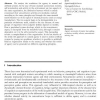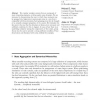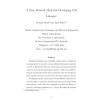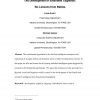101
click to vote
ALIFE
2005
15 years 1 months ago
2005
We analyze the conditions for agency in natural and artificial systems. In the case of basic (natural) autonomous systems, self-construction and activity in the environment are two...
130
click to vote
ALIFE
2005
15 years 1 months ago
2005
We consider complex systems that are composed of many interacting elements, evolving under some dynamics. We are interested in characterizing the ways in which these elements may b...
ALIFE
2005
15 years 1 months ago
2005
We present a novel formal interpretation of dynamical hierarchies based on information theory, in which each level is a near-state-determined system, and levels are related to one ...
111
click to vote
ALIFE
2005
15 years 1 months ago
2005
Recent years have seen the discovery of freely diffusing gaseous neurotransmitters, such as nitric oxide (NO), in biological nervous systems. A type of artificial neural network (A...
141
click to vote
ALIFE
2005
15 years 1 months ago
2005
We present a new definition of the concept of representation for cognitive science that is based on a study of the origin of structures that are used to store memory in evolving sy...
ALIFE
2005
15 years 1 months ago
2005
Biological development is a remarkably complex process. A single cell, in an appropriate environment, contains sufficient information to generate a variety of differentiated cell ...
ALIFE
2005
15 years 1 months ago
2005
119
click to vote
ALIFE
2005
15 years 1 months ago
2005
Deacon has recently proposed that complexes of genes can be integrated into functional groups as a result of environmental changes that mask and unmask selection pressures. For exa...
ALIFE
2005
15 years 1 months ago
2005
The embodiment hypothesis is the idea that intelligence emerges in the interaction of an agent with an environment and as a result of sensorimotor activity. In this paper we offer ...
103
click to vote
ALIFE
2005
15 years 1 months ago
2005
This review presents a review of prevalent results within research pertaining to emergent cooperation in biologically inspired artificial social systems. Results reviewed maintain ...





